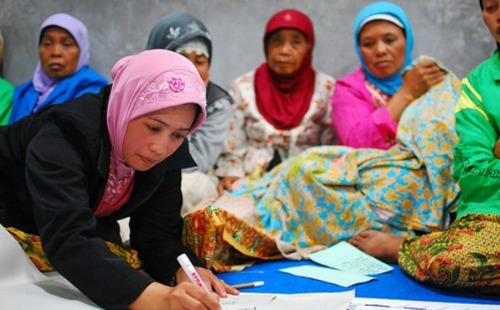An Analysis of Chapter Seven of the Global Study: Building Peaceful and Inclusive Societies in the Aftermath of Conflict
By Marina Kumskova
A woman leads a community meeting to discuss the reconstruction of a village in Yogyakarta, Indonesia. (Photo: The World Bank)
Chapter seven of the Global Study on the implementation of UNSCR 1325 addresses the role of women in building peaceful societies. It is often women peace advocates on the ground who are instrumental in stitching the fabric of society back together after a conflict has ripped it apart; women’s participation is crucial for economic recovery, political legitimacy, and social cohesion. However, women too often find themselves largely locked out of the decision-making forums for building a new society once conflicts are over. In addition, gender-responsive peacebuilding suffers from a lack of resources and political will, as well as from insufficient expertise and capacity, especially at the country level.
The chapter demonstrates that there must be a focus on long-term comprehensive programmes aimed at systemic changes. Without a systemic change to facilitate and enable political participation, economic security and physical safety, women will not be able to realize their potential as contributors to building peaceful societies.
Facts and Figures:
- The economy and market reforms - a standard component of post-conflict reconstruction - focus on building the economic space for men and often aggravate the burden of care on women and exacerbate inequalities (Global Study, 2015, 171);
Households transformed by conflicts frequently leave women as the head of the family. The challenge is to consolidate and expand gender equality and women’s empowerment once men return home, to prevent a reversion to pre-conflict norms that relegate women to the domestic sphere and reinforce old gender stereotypes (Global Study, 2015, 172);
Female ex-combatants have often been limited to choosing between activities such as hairdressing and tailoring, both of which could expose them to a lifetime of low wages and poor working conditions (Global Study, 2015, 172);
Women politicians in post-conflict societies continue to face harmful gender stereotyping, cultural and legal barriers and discrimination that cannot be addressed by gender quotas alone (Global Study, 2015, 175);
- Disarmament, Demobilization and Reintegration (DDR) processes that separate child and adult programmes present structural problems and fail to address the specific needs of young girls (Global Study, 2015, 179).
Key recommendations:
Ensure that all levels of peacebuilding efforts are preceded by mapping exercises to ascertain what programmes are relevant for communities affected by conflict, and which will most effectively empower women and girls economically, politically and socially;
Make effective and meaningful participation of women in decision-making and planning conditions of economic recovery and Disarmament Demobilization and Reintegration/Security Sector Reform programmes;
Adopt legislative and policy measures to ensure that women have equal opportunities to participate in the new, post-conflict structures of governance and security sector; and
Design programmes for economic recovery that target women’s empowerment and are forward-looking on transformative role women can play in an economy for future.
For more information, see UN Women’s Global Study Factsheets or the entire Global Study on Women, Peace and Security.

